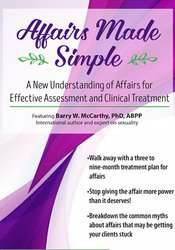

Affairs are all too common, approximately 35-45% of marriages experience an affair, and as a clinician you likely have a couple or individual on your case load who is struggling with the wounds of an affair.
Watch this recording and leave with a three to nine-month treatment plan for affairs that save your clients’ time, money and energy! This is a huge improvement from the traditional model that takes years to treat couples who’ve experienced an affair.
Most clinicians are approaching treatment wrong by giving the affair more power than it deserves, which causes the injured partner to get stuck. Rather than remaining stuck in the traditional model of an affair as a symptom of a relationship problem, this workshop provides you new skills in understanding, assessing, and treating affairs through a whole new lens.
Affairs are multi-causal, multi-dimensional, with a range of individual, couple, cultural, and value factors and meanings. Successful treatment requires you to carefully assess (rather than assume) the causes and meanings of the affair from the perspective of the involved and injured partners. Through this workshop, you will develop an effective model for assessment which leads to more successful clinical outcomes.
After watching this recording, you will be more prepared as a clinician to help the couple make a “wise decision” about whether to recommit to a satisfying, secure marriage or move toward a good divorce. If the decision is to recommit, you will gain skills to support the recommitted couple with tools for sexual recovery and creating an individualized affair prevention plan.
Stop giving the affair more power than it deserves and gain a new understanding on how to more effectively treat affairs!
| File type | File name | Number of pages | |
|---|---|---|---|
| Manual (1.17 MB) | 64 Pages | Available after Purchase |

Barry W. McCarthy, PhD, ABPP, is a board certified clinical psychologist (ABPP), certified marital and sex therapist, and a tenured professor of psychology at American University. His clinical expertise focused on integrating sex therapy strategies and techniques into individual and couple therapy, assessment and treatment of the most common male and female sexual problems, and a special expertise in the treatment of sexual desire disorders.
Dr. McCarthy earned his BA from Loyola University and his MA and PhD from Southern Illinois University. His professional memberships include the American Psychological Association, American Association of Marriage and Family Therapy, Society for Sex Therapy and Research, and Association for Behavioral and Cognitive Therapies. He is a Diplomate in sex therapy earning this from the American Association of Sex Educators, Counselors, and Therapists.
As a leading expert in this field, Dr. McCarthy has presented over 350 workshops around the world, and his extensive list of publications includes over 100 professional articles, 26 book chapters, and co-authorship of 14 books, including Rekindling Desire (2nd edition), Sexual Awareness (5th edition), Enduring Desire, Discovering Your Couple Sexual Style, Men’s Sexual Health, Coping with Erectile Dysfunction, Getting It Right the First Time, and Coping with Premature Ejaculation.
Speaker Disclosures:
Financial: Dr. Barry McCarthy is a published author and receives royalties. He receives a speaking honorarium, book royalties, and recording royalties from PESI, Inc. He has no relevant financial relationships with ineligible organizations.
Non-financial: Dr. Barry McCarthy has no relevant non-financial relationships.
Please wait ...